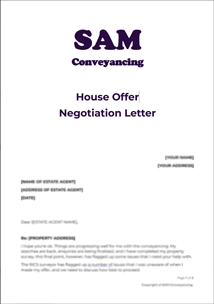Can You Make an Offer on a House Without Selling Yours?
Found your dream home but haven't sold your current one? You're not alone, and there's no need to worry because it's a common situation for home movers. The answer is yes, it's possible.
However, while the excitement of a new home is tempting, making this move without a clear strategy can be tricky. This guide will walk you through the advantages and disadvantages of making an offer before selling, helping you decide if it's the right strategy for your circumstances to land your perfect property.
Whilst securing your new home means you know where you'll end up, you risk losing it if you don't properly structure your offer with the seller. We explain exactly how you can secure your new dream home, and don't lose it if the process takes longer to sell your old home.
Putting an offer on a house before selling yours
How buying before selling affects your mortgage application
When you make an offer on a new house before selling your current one, lenders will need a clear picture of your overall financial situation.
This is because they need to be confident that you won't become overstretched financially. Having a clear plan for selling your existing property will strengthen your application.
They'll assess your ability to manage two properties, even if temporarily. This often means considering:
- Your existing mortgage: What's the outstanding balance? What are the monthly payments? Lenders will factor this into your affordability calculations.
- The potential new mortgage: How much are you looking to borrow? What will the estimated monthly payments be?
- Your deposit: Where will the deposit for the new property come from? If it's tied up in the equity of your current home, you'll need a plan to access it.
- Overall affordability: Lenders will scrutinise your income against the total outgoings of both properties (mortgages, council tax, utilities, etc.) to ensure you can comfortably afford the new purchase.
Bridging Loans: Short-term solution?
One way some buyers bridge the gap between buying a new home and selling their old one is through a bridging loan. These are short-term loans designed to provide the funds to purchase a new property while you're still selling your existing one.
They typically have higher interest rates and are meant to be repaid quickly once your current home sells. Bridging loans can help you act fast to secure a property you love, but they come with risks if your sale takes longer than anticipated.

How To Buy A House Without Killing Anyone could be the difference in every mover’s dream: buying and moving into your new home stress-free...
OR: stress, missed deadlines, legal disasters, building defects, and possibly the collapse of the whole transaction.
(Costing you a small fortune, a head full of grey hairs, and driving you to threaten the life of your solicitor, lender, co-owners, family, partner, or some combination of all five).
£9.99
Making a 'Subject to Sale' offer
A 'subject to sale' offer is precisely what it sounds like: an offer to buy a property that is conditional upon you successfully selling your own existing home.
This means that the purchase will only proceed if and when your current property is sold. It's a way to try and secure a new home without being in a financial position to complete the purchase until your sale goes through.
How often are 'Subject to Sale' offers accepted?
Several factors affect how often these offers are accepted:
- The current market conditions: In a seller's market (where demand is high and supply is low), sellers are less likely to accept offers that introduce uncertainty, such as a "subject to sale" clause. In a buyer's market, they may be more open to it. For current insights, refer to our latest Housing Market Report.
- The attractiveness of your offer: Even with the condition, a strong price or other favourable terms might make a seller more willing to consider it.
- The seller's urgency: If the seller is keen for a quick sale, they might be less inclined to wait for your property to sell.
- The status of your property sale: If your home is already under offer or has strong interest, your "subject to sale" offer might be viewed more favourably.
The property market constantly evolves. While local conditions vary, sellers will always weigh the certainty of an unconditional offer against the potential delay of a 'subject to sale' one.
- Expert panel of conveyancing solicitors with local knowledge.
- Your transaction is protected by our No Sale, No Fee policy. Terms apply.
- Fixed fee conveyancing.
- We are on 99% of mortgage lender panels.
- We can solve any property challenge.
How to strengthen your offer when buying before selling
Making an offer on a property when you still need to sell your own can put you at a disadvantage compared to chain-free buyers. However, there are several strategies you can employ to make your offer more appealing to the seller:
Be transparent about your situation
Clearly communicate the status of your current property sale. If it's already under offer, provide details and evidence if possible. Honesty helps manage the seller's expectations.
Price your offer strategically
Research recent sold prices in the area and consider offering a strong, competitive price. Sometimes, a slightly higher offer can compensate for the uncertainty of your chain.
Want to know how much to offer? Try our free online house offer calculator:
Show you're a serious buyer with a Mortgage in Principle (MIP)
Having a MIP demonstrates to the seller and estate agent that you've been financially vetted and are likely able to secure the necessary funds once your sale completes. This can significantly increase the credibility of your offer compared to those without one.
Be flexible on timescales
Speak to the estate agent about the seller's preferred timeline and see if you can accommodate it. Being flexible on completion dates can make your offer more attractive.
Consider a larger deposit
Offering a larger deposit can provide the seller with greater financial security. It shows your strong financial commitment to the purchase, reducing the risk of the sale falling through on your end. This can make your offer more attractive, especially if the seller is concerned about the reliability of your chain.
Remember, clear communication and demonstrating your readiness to proceed (financially and logistically) are key to making your offer stand out, even when it's contingent on selling your current home.
The downside of offering on a house before selling yours
- Increased financial pressure - If your current home takes longer to sell than anticipated, you could find yourself temporarily responsible for two mortgages, council tax bills, and utility costs. To mitigate this, carefully assess your affordability for carrying two properties for a period and have a realistic sales strategy for your current home.
- Risk of losing your dream home - Sellers might have other offers, particularly from chain-free buyers, and could become impatient. To counter this, ensure you have a reliable estate agent and that your property is priced competitively to attract a buyer quickly. Staying in close communication with the seller of your new home can also help.
- Lower offers on your property - Potential buyers for your existing home might try to negotiate a lower price. To avoid this, try not to reveal your urgency and ensure your property is well-presented and marketed effectively to attract the right buyer at the right price.
Consider using a solicitor who offers a "no sale, no fee" service to reduce the financial risk if your sale falls through.
What if I don't tell the seller I am also selling?
This is generally not a recommended strategy. If your seller is also buying an onward property, they are reliant on the smooth progress of your transaction to secure their own dream home.
Failing to inform them that your offer is contingent on you finding a buyer can severely frustrate the entire property chain.
For example, if you proceed for three months without disclosing your situation, only to then require another three months to find a buyer for your property, it can lead to significant delays or even a collapse of the entire chain. Transparency from the outset helps manage expectations and reduces the risk of frustrating all parties involved.
Using a Bridging Loan to buy your next home
As we mentioned earlier, a bridging loan can be a short-term financial tool to help you buy a new property before you've sold your existing one. It essentially 'bridges' the gap between the two transactions.
How Bridging Loans work
Typically, a bridging loan is secured against your existing property (or sometimes the new one). The loan amount is usually intended to cover the purchase price of the new home, plus any associated costs. You generally pay interest on the loan, and the principal is repaid when your current property sells.
Keep in mind that when budgeting for your move, you'll also need to account for Stamp Duty Land Tax (SDLT) on the new purchase, and the proceeds from the sale of your current home will ideally cover the bridging loan and other moving expenses.
Pros of Bridging Loans
- Allows you to buy your new home before selling.
- Can help you act quickly to secure a desired property.
Cons of Bridging Loans
- Often come with higher interest rates than standard mortgages.
- Are typically short-term, requiring quick repayment.
- You need a solid plan for selling your existing property.

- No Sale, No Fee (Auction, Right to Buy, and Repossession excluded).
- Initial deposit applied to your second transaction with no questions asked or time limits.
- Fixed fee quotes.
- We are on 99% of mortgage lender panels.
- We can solve any property challenge.
Managing the timing: Other strategies to consider
Contingent offers
One way to manage the timing when buying before selling is to make a contingent offer, meaning your offer to purchase the new property depends on a specific condition being met.
The most common type of contingent offer in this scenario is a 'subject to sale' offer, where your purchase is conditional on you successfully selling your current home.
While this directly addresses the timing issue, the likelihood of a seller accepting a contingent offer varies depending on market conditions and their individual circumstances.
Asking for an extension
If you've found a property you love but need more time to sell your current home, another approach is to ask the seller for an extension. This involves negotiating a longer timeframe between your offer being accepted and the exchange of contracts.
Being upfront with the seller about your situation is crucial here. They might be more amenable if your property is already under offer or if the market isn't particularly fast-paced.
Is buying before selling right for you?
- What is the state of the property market in your area? Are houses selling quickly? Is it a buyer's or seller's market? This will influence the likelihood of a 'subject to sale' offer being accepted and the speed at which your own property might sell.
- What is your financial situation? Can you comfortably afford to manage two properties, even temporarily? Do you have access to a deposit for the new home if your equity is tied up? Have you explored bridging loan options?
- How desirable is the new property? Is it a unique opportunity that might not come around again? This might make you more inclined to take on the challenges of buying before selling.
- What is the status of your current property? Is it already on the market? Are you getting viewings? Is it under offer? The more advanced your sale, the stronger your position.
Ultimately, the best approach depends on your individual circumstances, your risk tolerance, and the specifics of the properties involved.
Summary
There's a clear risk when putting an offer on a property if your current home hasn't sold. While it might feel like you're securing your next dream home, until you exchange contracts on both your sale and purchase, that dream can turn into a nightmare.
If you choose to take this risk, transparency is key. Ensure you tell the seller about your position from the outset. Keep them updated on milestones you hit with your purchase and when you find a buyer. Use the estate agent to facilitate communication across the chain.
Buying a house in a chain will naturally make you nervous, so be prepared for all the risks and for conveyancing to potentially take longer. Remember, each transaction in a chain is interlinked.
If you're planning on making an offer and want to discuss your options, get in contact us today.
Download a house price negotiation letter template, free from hassle.
- Instant download.
- Easy to fill in.
- Suitable for negotiating offers after the survey.
- Templates for initial and final offers.
The templates will be attached to your confirmation email after payment. Please allow a couple of minutes for the email to arrive.

Jack is our resident Content Writer with a wealth of experience in Marketing, Content, and Film. If you need anything written or proof-read at a rapid speed and high quality, he's your guy.
Caragh is an excellent writer and copy editor of books, news articles and editorials. She has written extensively for SAM for a variety of conveyancing, survey, property law and mortgage-related articles.










